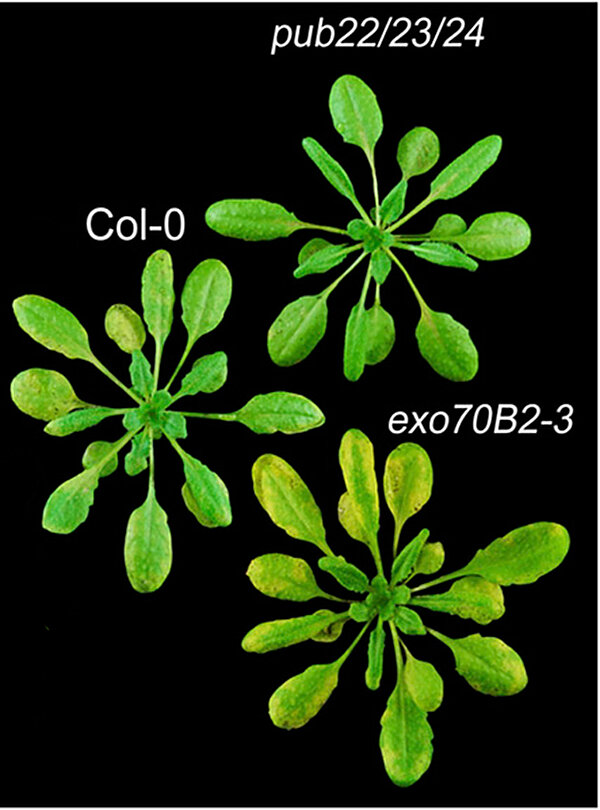Martin Stegmann and Marco Trujillo in collaboration with Japanese, Czech and American scientists recently discovered a positive regulator of the plant immune response. Thus, the protein Exo70B2 enhances plant defense reactions against pathogens. As a component of the so-called exocyst complex, Exo70B2 also plays an important role in the early stages of exocytosis. Now, the authors were impressively able to demonstrate that the protein also acts as an enhancer of the early plant immune response. Arabidopsis mutants that do not produce Exo70B2 anymore, show increased disease symptoms after infection with the plant pathogen Pseudomonas syringae. Because the plant immune response starts with the activation of plasma membrane receptors, it is assumed that the exocyst complex is involved in the transport of several membrane proteins. This new assembly of receptors at the membrane stimulates and thus enhances the plant defense reaction.
Furthermore, Exo70B2 was identified as an interacting partner of the ubiquitin ligase PUB22. In the course of infection, PUB22 is responsible for the transfer of ubiquitin molecules to Exo70B2 and thus marks this protein for degradation. In this way, PUB22 ensures the reduction or termination of the activated immune response.
For the first time in molecular plant research a connection between two different processes, namely vesicular transport and early immune reactions, could be found by the characterization of Exo70B2.
The complete research work was published in The Plant Cell (impact factor: 10,125).
Plant immune response – ubiquitin regulates defense mechanisms

[Translate to English:] Das Protein Exo70B2 wird für die Resistenz gegen Krankheitserreger benötigt. Wenn es ausfällt, wie in der Arabidopsismutante exo70B2 (unten), entwickelt die Pflanze verstärkte Krankheitssymptome, nachdem sie mit dem Erreger Pseudomonas syringae infiziert wurde. Wird hingegen das Gen für die Ubiquitinligase PUB22 inaktiviert (oben), ist sie resistenter als die unveränderte Wildtyppflanze Col-0 (Mitte).
[Translate to English:] Das Protein Exo70B2 wird für die Resistenz gegen Krankheitserreger benötigt. Wenn es ausfällt, wie in der Arabidopsismutante exo70B2 (unten), entwickelt die Pflanze verstärkte Krankheitssymptome, nachdem sie mit dem Erreger Pseudomonas syringae infiziert wurde. Wird hingegen das Gen für die Ubiquitinligase PUB22 inaktiviert (oben), ist sie resistenter als die unveränderte Wildtyppflanze Col-0 (Mitte).


